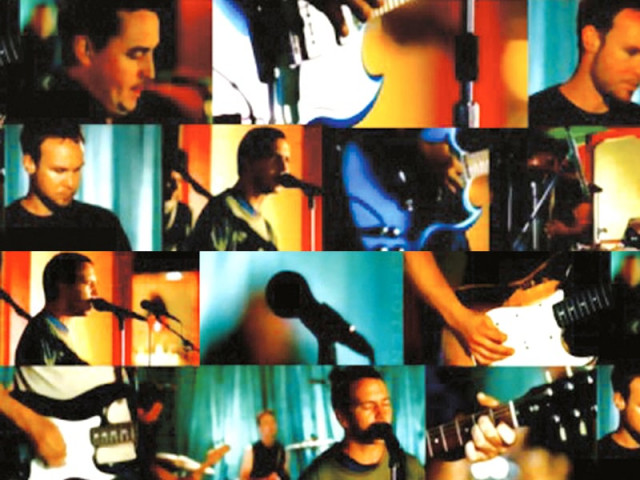The ‘Vedderisation’ of Pakistani rock: It’s still alive
Pearl Jam marks its 20th anniversary with a documentary tribute by Cameron Crowe.

The ‘Vedderisation’ of Pakistani rock: It’s still alive
Pearl Jam Twenty is Oscar-winning writer-director Cameron Crowe’s documentary tribute to the prolific band that initiated the ‘grunge’ movement 20 years ago, along with Nirvana, Soundgarden and Alice In Chains. Friends with Pearl Jam since his days at Rolling Stone magazine, Crowe cut the documentary from over a thousand hours of footage and interviews to “give audiences a visceral feeling of what it is to love music and to feel it deeply”.
This nostalgic journey pays homage to a band that has also unknowingly fuelled the evolution of indie rock in Pakistan. The ‘Vedderisation’ (a term coined from Pearl Jam’s frontman Eddie Vedder) of the Pakistani music scene began during the Benazir-Nawaz years of the early to mid 90s, fuelled by the advent of MTV Asia among English-speaking segments that could afford satellite TV. Drawn towards the Seattle sound, a series of underground acts emerged, first as cover bands and then as original musicians in their own right. Distinctive from their pop-style electronic predecessors, they echoed grunge aesthetics that were to define a plaid wearing, ripped jeans-touting subculture of their generation. Longhaired, self-taught musicians emoted rock music with poignant lyrics, echoing the torment of being a teenager in the relatively constrained society of the time.
Despite the overwhelming preference by Pakistan’s private school demographic for Bryan Adams-style ballads, grunge emerged with an avid local fan-following that filled amphitheatres with rock performances featuring head banging and bodysurfing et al. In Lahore, one such band was Co-VEN. “I don’t think there were people more affected by the grunge movement in this country than us,” recalls the band’s founding member Atif Saeed.
Farhad Humayun of Overload remembers: “Grunge wasn’t just a genre in music, it was a lifestyle. For a suppressed nation where kids are told what to do, it was a breath of fresh air.” Sufi-influenced rockers like Junoon and the Mekaal Hasan Band are more likely to count classic rock icons like U2 and Led Zeppelin as their early inspiration, but even Mekaal Hasan admits to an appreciation of Soundgarden and Alice In Chains.
Banker-turned-musician Nabil Qizilbash was a pre-teen then: “That was a frustrating time because there were virtually no stores that carried electric guitars, let alone guitar pedals, amplifiers or even guitar strings.” He added: “Teenagers were starving to see a live rock show. It’s not like Nirvana or Guns N’ Roses were coming to our town any time soon, so cover band performances were the closest we were going to get.”
In the meantime, Alternative music had entered mainstream international pop culture, prompting fashion houses to promote an industry of Caterpillar boots, Converse sneakers, designer-ripped jeans and Chanel’s Vamp nail polish and lipstick, from Alannis Morissette’s feisty rocker to Courtney Love’s heroin-chic and Kate Moss’ fashionable waif.
Since grunge there has been post-grunge, progressive rock, derivatives of metal and punk and even Sufi-rock. Yet, today’s 30-somethings find something resonating about the Seattle sound that has somewhat fused with Pakistan’s rich emerging rock culture, often ludicrously cited in the foreign media as ‘Taliban-defying rock’ — as if that was its motivating factor.
The appreciation for music seems mutual, however. Front runner Eddie Vedder, iconic for his emotive baritone that has since been echoed by Creed and re-echoed by Call, and his angst-ridden performances with socially conscious lyrics, was drawn to maestro Nusrat Fateh Ali Khan’s Musicology course at the University of Washington in Seattle back in 1992. This led to a 1995 groundbreaking Khan-Vedder collaboration on East-West fusion masterpieces — “Face of Love” and “The Long Road” — featuring haunting melodies, tablas and acoustic guitars. Following Khan’s death, Vedder performed live with Rahat Fateh Ali Khan in one of the world’s earliest Sufi-rock collaborations.
Vedder continued on his pursuit of independent projects while remaining with Pearl Jam. In this vein, he progressed from grunge-god to a contemporary voice fusing classic and folk rock, including his award-winning soundtrack for Into the Wild to Ukulele Songs, currently topping Billboard’s Folk Albums.
Watching Pearl Jam Twenty delve 20 years into its history provides insight for today’s musicians struggling to maintain artistic integrity in the face of blatant commercialism. As Mekaal puts it: “Have you heard the mainstream lately? It’s still bad, it was mostly always bad, and I daresay it will always cater to the lowest common denominator. While there are great bands around the world and in Pakistan, their exposure and promotion often seems to be of the blandest, most predictable and sterile music — music with the soul of a rice cake.”
Pearl Jam Twenty is due for a September theatrical release along with an accompanying book, soundtrack and concert weekend to commemorate the band’s 20th anniversary. Pearl Jam is currently recording their 10th studio album.
For an unabridged version of this article click here.
Published in The Express Tribune, June 16th, 2011.



















COMMENTS
Comments are moderated and generally will be posted if they are on-topic and not abusive.
For more information, please see our Comments FAQ